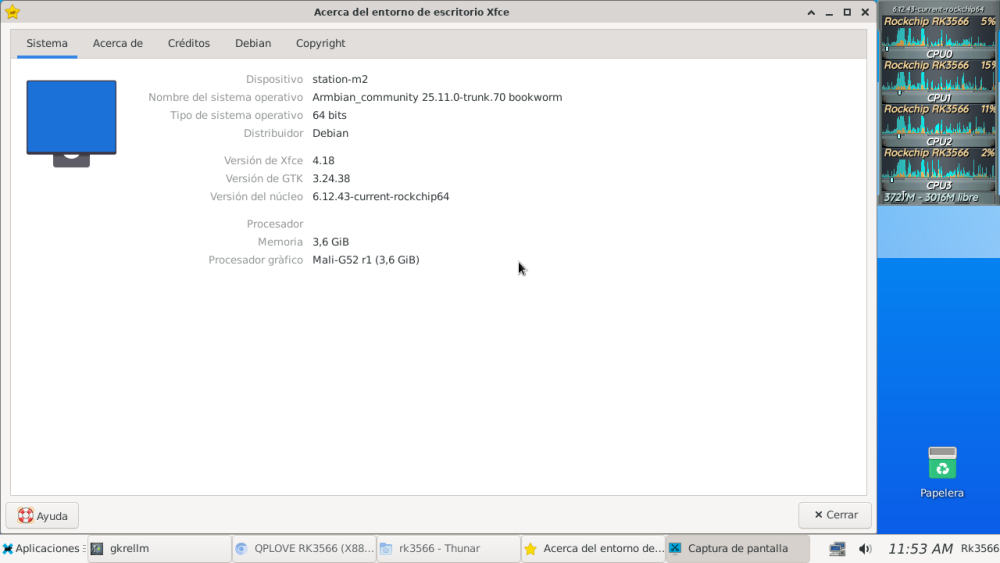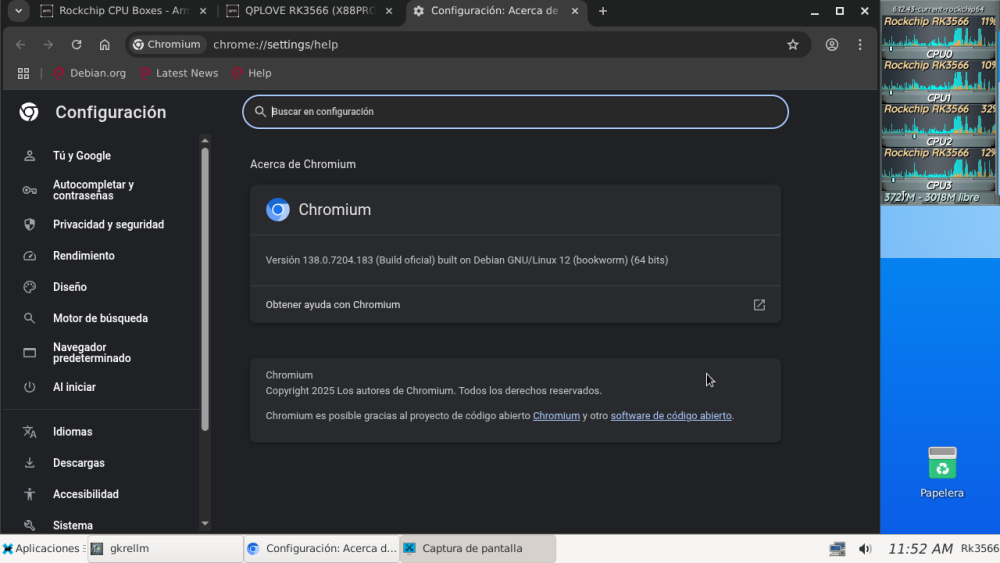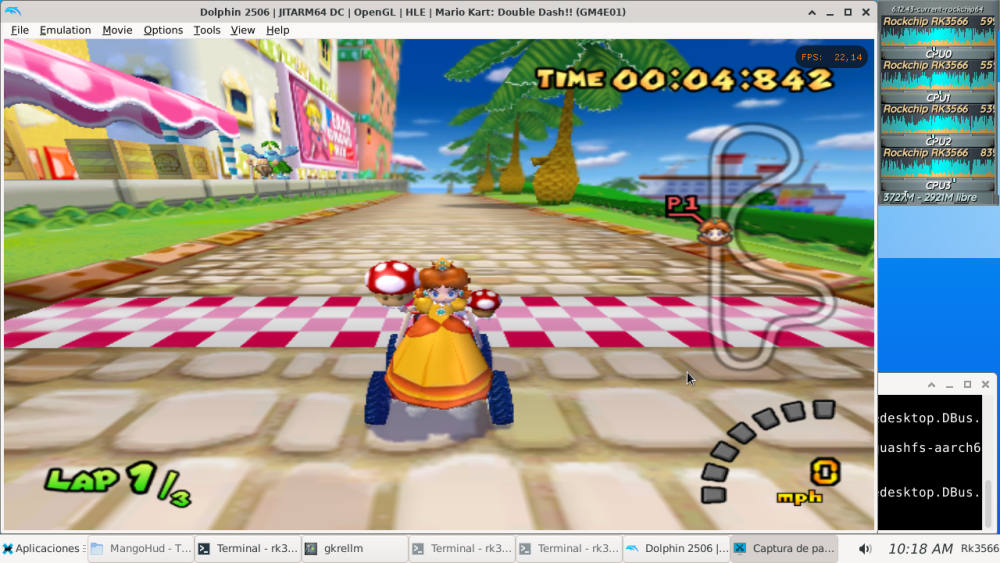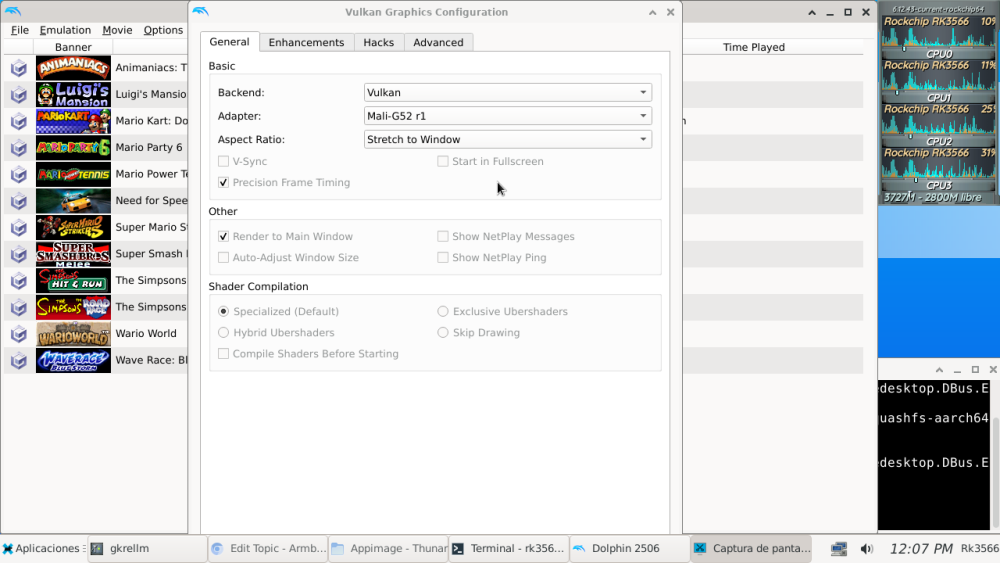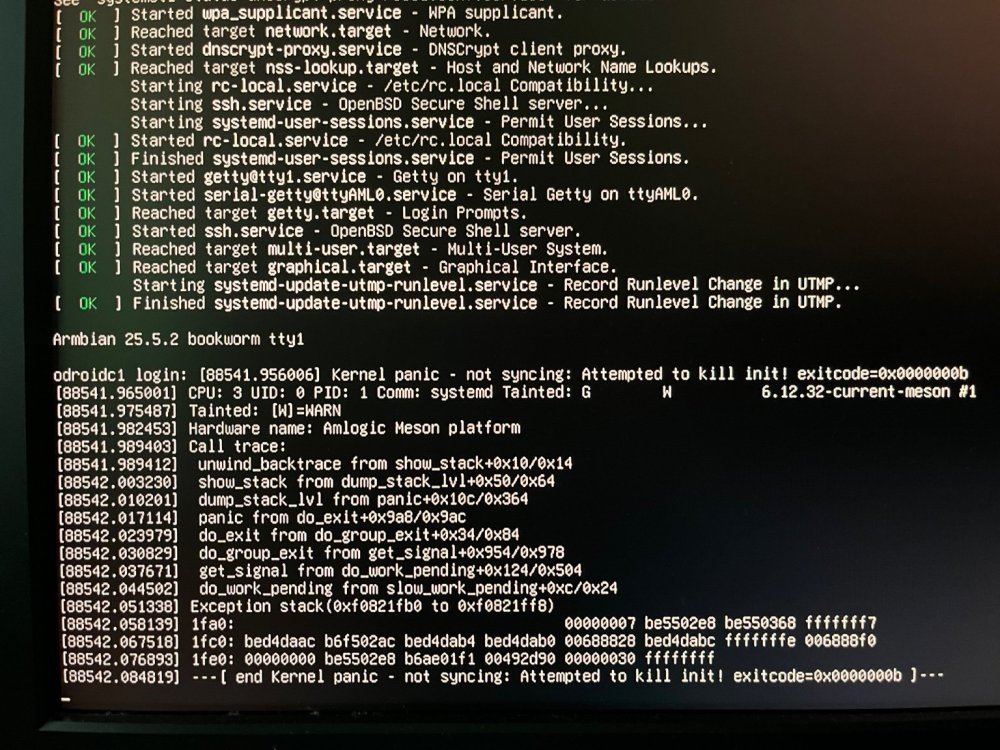All Activity
- Past hour
-
Thanks for sharing your installation. Really, the Rockship in TV BOX seems the easier Armbian installations that I already tested, although, I use a TVBOX with ab AMLOGIC S912.
- Today
-
This case is a clone of X88PRO: However i use HK1 rom because regular x88pro lack of many features like saf and without this dolphin-emu and others dont allow use external devices another thing added in HK1 rom is cpu thermals, cpu load and memory load in status bar but use this rom make frontal screen in tvbox dont work In my case armbian works using information from this themes: armbian using now is based on station-m2 image from here: https://www.armbian.com/station-m2/ https://github.com/armbian/community HDMI - works (need to check hot plugging) HDMI sound - works USB 2.0 - works USB 3.0 - works (using now usb 3.0 hub with power adapter) LAN - Works WLAN - Works SD-Card booting and detection - works RKDevTool installing and loading images on/from eMMC - works GPU - works Hardware video acceleration (except for browsers) - works Dualboot if you flash new bootloader (SD-Card boot high priority) - works Loader* from vontar work ok for use sd boot *For use this follow steps in vontar guide, work ok in dual boot (armbian on sd and android in emmc) rk3566-box-demo.dtb dont recognize usb keyboard but using rk3566-box-demo_x96x6_24_custom.dtb from x96 x6 theme work correctly and hub work on usb 2.0 and on usb 3.0 too also in usb 3.0 port have a 500GB HDD Laptop USB Drive In other things can install xfce desktop, lightdm, xorg, chromium, firefox, nm (for lan), xarchiver, dolphin appimage also can enable panvk using this: VK_ICD_FILENAMES=/usr/share/vulkan/icd.d/panfrost_icd.aarch64.json PAN_I_WANT_A_BROKEN_VULKAN_DRIVER=1 from here:
- 1 reply
-
1
-
Hi, First of all, thank You for your work. On a project we are using Nanopi Neo Air boards with an Allwinner h3 processor and a 8GB eMMC flashed with an Armbian OS: $ uname -a Linux <DEVICE_HOSTNAME> 6.6.75-legacy-sunxi #1 SMP Sat Feb 1 17:37:57 UTC 2025 armv7l GNU/Linux $ lsb_release -a No LSB modules are available. Distributor ID: Debian Description: Debian GNU/Linux 11 (bullseye) Release: 11 Codename: bullseye Recently we have been getting increasing reports of the boards being stuck on boot, on message 'Starting Kernel ...' (checked from logs available on COM port). Although this behavior is highly undesirable, since the eMMC is visible in device tree when booting from an SD-Card, it can be recovered by running command $ fsck /dev/mmcblk2p1 In order to reproduce this behavior we have set up a continuous power cycle test where, booting from eMMC: Device is powered on After 70 seconds (enough time for the system to boot), power supply is interrupted Device remains powered off for 10 seconds This would account for around 1000 power cycles per day and we were able to get the device bricked in the range of 68 to 5500 power cycles. We then repeated the test but by booting from an SD-Card and were not able to reproduce the issue, having reached power cycle counts of 34381. Does anyone have a clue on why the eMMC displays this behavior, or is someone able to provide some guidance on what we could do/check to try to prevent this from happening (or making the eMMC more resilient to power cycles)?
-
@dale I remember wifi stopped working once. You could try this branch and see if it works for you. I haven’t tested it on my x98h yet. On transpeed the a/v audio has issues so I haven’t released images. https://github.com/NickAlilovic/build/tree/v20250407
-
The deep rabbit hole of (DAS) UBOOT !! This is not for you if you is running on: Internal eMMC with factory Android boot loader. eMMC with updated boot loader but no other boot media. eMMC with updated boot loader and second boot loader and system on SC-Card and no other boot media (Jump booting eMMC > SD-Card). eMMC erased / not working and loading boot loader and system and boot loader from SD-Card and no other boot media, But if you is running on: eMMC with updated boot loader and jump booting to SD-Card with boot loader and booting from there other media. eMMC erased / not working and loading boot loader (and perhaps system) from SD-Card and jump booting other media. Then jump booting on one SD-Card the UBOOT is loading the init system with first stage of the kernel from the SD-Card. If have one compatible second stage boot on the SD-Card and UBOOT is loading it it shall being OK. But as all armbian media have the the same "rootdev=UUID=c6b30a59-8162-46cb-b449-e9615c4a9889" or lable in the armbianEnv.txt on the uboots boot partition its "roll the dice" witch partition the kernel is using then its have loading. If using the SD-Card and its current with the uboot kernel all is OK. But around 50% is using one of the USB media and if its boot partition is not in sync with the kernel its being very strange. If having one SD-Card with latest noble with updated system and kernel 6.16X and putting in one USB-SSD with one old Jammy and uboot on the SD-Card is booting it is the first kernel loading first stage from the SD-Card (sd /boot) and then mapping the system with /boot from the USB-SSD. The result is very interesting then the old Jammy is coming up with 6.16X kernel but cant loading modules that it need after the first stage of booting then the /boot/ is the Jemmy with original system and modules that the 6.16X kernel cant using (but its BOOTING !!!). For booting the system in the right way its possible caging the "rootdev=" UUID or lable in the armbianEnv.txt on the SD-Cards /boot. Its working but you is missing the auto select of boot media = if labling the USB-SSD "SSD" and putting in the lable "SSD" it cant boot the system on the SD-Card or other USB devices (and i think its still getting mixing files from the SD-Card and SSD). Also formatting the XF4 partition on the SD-Card (not touching the partition table) its booting all USB media OK then uboot is using the system and boot form the USB media and only mini loader from the SD-Card. Or if having the same system type / version it shall working updating both the system to the same level and have the same hard and software configured on the SD-Card and the USB system media. Normal symptoms is problem with network manager starting all services, Docker service not starting and other services can having problems. Also if installed kernel and the real booted one is not the same its not good then its being miss match of many files its depends on. I have using the erase and sync method and its looks working OK but the sync is more work but can have more systems working OK as backup if somthing is going wrong. As long our UBOOT cant select / and /boot partitions like in X86 systems wi must living with that but if knowing how its working we can living better with it. PS: some version of armbian-config can force witch media to boot from but i have not testing it and its not in the latest version also i have not testing eMMC with updated boot loader and jump booting then the box i testing it on have failed eMMC so only SD-Card boot = no risk for bricking the system hard and must force mask-rom. So now running Noble with 6.16.1-edge-rockchip64 kernel !!!
-
I am currently developing an application that requires using monitor mode with RT8821CU chipset (rtw88 kernel driver). Previously I was using RaspberryPi OS and everything worked great, but I am moving to Armbian mainly to be able to target more SBCs. The problem is in Armbian, the WiFi monitoring performance is much much worse (at least with the RT8821CU) than with RaspberryPi OS and with my Arch laptop, and I cannot guess why could this be. I have tested on the rpi4b the following: * Build the rtw88 driver with debug and debugfs enabled just in case. * Test with all the three kernel versions available (edge 6.16, current 6.12, legacy 6.6). None of them achieves decent performance. * Test the 8821cu driver (**a different driver than the rtw88**): seems to have better perf, but doesnt support the fcsfail feature I need and is quite unstable (for example creating a new interface on the device phy using iw, causes the system to freeze and requires a hard reset, and on some circumstances, calling iwconfig also freezes the system). * Try all of the above on the community supported OrangePi 3 LTS: same result, I have the same poor WiFi monitoring performance as with the rpi4b * Cross compile the Raspberry Pi kernel myself (I tried with version 6.6) with rtw88 driver enabled, and manually install it in my rpi4b Armbian SD card (copy the kernel, dtb files and modules, and create appropriate symlinks): I get the same perf as in Raspberry Pi OS! So there must be something with the kernel built with Armbian that is causing this monitoring performance degradation. Unfortunately I am clueless about what could be causing the problem. I have reviewed the kernel configuration, and all options related to the RTW88 driver are the same. But there must be something elsewhere that I cannot find. Any suggestion about what could be the problem or how to debug it? Thanks in advance!
-
I usually check here every couple of days: https://patchwork.kernel.org/project/linux-rockchip/list/ Yes, they will be included in edge kernel and in a year or two when the next LTS kernel hits they'll be included in current as well.
-
Thank you @Werner, that makes, sense and I'll follow your advice. Can you please tell me where do you check those updates? And should I assume that when those changes are completed in mainline, they'll make it to the Armbian distribution with the regular updates? Or will I need to change to a different one if noone updates this one? Thank you again. Kind regards
-
Which version or image is that ? From here ? https://joshua-riek.github.io/ubuntu-rockchip-download/boards/rock-5b-plus.html 5.10 kernel or 6.1 kernel? As already indicated, 'images' usually do have a too big scope for identifying the core issue for flaky boot or crashes etc. Also the Armbian '25.5.1' and '25.2.2' are just a text in some file. For my installations that have been always in-place upgraded, they are wrong anyway. Stating buster when I just did reboot into upgraded trixie for example (NanoPi-NEO). W.r.t. PCI-E, and other specific Rockchip HW, 5.10 (legacy) likely has best support. At least for my ROCK3A, I then have RPi camera V1 support (not tested but required overlays are missing in 6.1). Also w.r.t. the earlier mentioned PCI-E NVME+SATA issue, I got it working by merging the Radxa 5.10 ('latest') kernel + Radxa U-Boot '2017' with some Noble userspace from around December 2024. Now Bookworm by the way as I don't want netplan.io. In a running system (NVME working), you could run 'sudo lspci -vv' and look at Capabilities. When non-working NVME, so boot from SD-card and maybe SPI empty or disabled so only the U-Boot from the SD-card is used, it also might give hints. At least I see that SSD can do 8GT/s 4-lane, while RK3588s (NanoPi-R6C) then has to use 5GT/s 1-lane. It is 6.16.1-edge kernel with EDK2-UEFI v1.1 in eMMC. I don't understand all items, but at least some, w.r.t. power-save (ASPM) among those.
-
Hello In the past I installed armbian into emmc (a95xf3-air) with a USB key. All was ok. Now I would like to do a fresh install with the current release : I burned the image, make the changes (extlinux …) Boot with the "toothpick" method, ssh , the armbian release is the old one from the emmc, not the recent from the key. How is it possible to boot with the recent one with ssh (no display no keyboard) ? And after copy the new release to emmc. Thanks for help
-
@robertoj thank you for the answer. I will look at it. @Nick A Hi Nick, for your x98h box, is the wifi working after a reboot command?
-
I am observing the same thing. This can be easily fixed by setting the max frequency manually; https://www.incertum.net/post/2024/armbian-cm3588/ I checked `cpufreq-info | grep "available frequency steps"` And made this to set the correct speed for all the cores on the RK3588 NAS KIT # Little cluster (A55 cores: cpu0–cpu3) for c in 0 1 2 3; do cpufreq-set -c $c -g schedutil -u 1.80GHz done # Big cluster (A76 cores: cpu4–cpu7) for c in 4 5 6 7; do cpufreq-set -c $c -g schedutil -u 2.40GHz done Now running `watch -n1 "cat /sys/devices/system/cpu/cpu*/cpufreq/scaling_cur_freq"` together with `for i in $(seq 1 $(nproc)); do yes > /dev/null & done` shows the frequencies going up correctly, and down too when I `killall yes`
-
Not sure for what you need it but here: https://github.com/u-boot/u-boot tag specification and defined patch sources are here:
- Yesterday
-

Plymouth-quit-wait.service hangs booting
robertoj replied to Dais's topic in Software, Applications, Userspace
Get the microsd card mounted in your linux laptop Open /boot/armbianEnv.txt Add the line: extraargs=plymouth.enable=0 disablehooks=plymouth https://wiki.archlinux.org/title/Plymouth When you get booted in your armbian OS: sudo apt remove plymouth -
I don't know anything about this patch, but check this: * Linux version you are using, vs Linux version corneliius has used * Try deleting the hunk in the patch that caused the problem you saw, and see if other hunks cause patch failures * If it is only one hunk causing the problem, look at the file that is affected by the patch drivers/auxdisplay/Makefile: do the lines mentioned in the hunk exist in the Makefile? In the expected line number?
-
Well apparently it is an issue, as stated above by @JFL. Also, after a RECALL, I'm the one who did the PR to change it from =y to =m. https://github.com/armbian/build/pull/8300/commits/bb71177580b34c1aeaeb601696d603b6dc49d326 As for udev and delay, you could edit the udev system file; /lib/udev/rules.d/50-udev-default.rules The line you want to edit is about 15 lines down. Change from rtc0 to rtc1.
-

Make hym8563 default RTC (RTC0) by kernel
OleksandrK replied to OleksandrK's topic in Nanopi R3S LTS
Interesting. I wonder how the FriendlyElec stock kernel is assembled, because according to the log the stock system doesn’t use any Rockchip clock—only the HYM8563. -

Make hym8563 default RTC (RTC0) by kernel
OleksandrK replied to OleksandrK's topic in Nanopi R3S LTS
No issue, because it would behave the same as the default Rockchip system clock. Moreover, by default `fake-hwclock` is running, so after connecting a battery the user would just need to uninstall `fake-hwclock`. That shouldn’t be a problem. -
I am trying building image natively on orangepiplus, but the scripts are not designed to complete it. System incompatibility, lack of packages for this distribution etc make it fail. How do you manage building it with this Armbian's official building tool ? I am very curious to discover the right approach as I need adding in-kernel modules, which you can't build as stand alone. At the same time, where can u-boot be downloaded from? I understand, that it was updated in 2024 : [🌿] {u-boot:1} Preparing u-boot targets packaging [ 2024.01 ] [🌿] {u-boot:1} Deploying u-boot binary target [ 2024.01 :: u-boot-sunxi-with-spl.bin ]
-
Hello again, Yes, I read the documentation, that's why I said my UART adapter doesn't work and I ordered a compatible one which is on its way. I managed to somehow solve my issue. Luckily I had another SSD lying around (Kingston) which works without any issue and is recognized every time and bootable. My original SSD (Crucial) has no hardware problems though, because I used it in an x86 Ubuntu machine and works without any problem whatsoever. So although I managed to solve my situation, the underlying problem is still there and may re-surface to someone else. I would like to re-state that the 25.5.1 armbian desktop does not even boot (edge or vendor) and the 25.2.2 boots but barely works on my board. Thanks for the time. PS. I ended up using JR ubuntu, because although non-supported anymore, it was the only one working. If you find my situation is worth further investigation and you would like to look into it, I can send you the serial logs once I get the proper adapter.
-

Plymouth-quit-wait.service hangs booting
DwarfDecker replied to Dais's topic in Software, Applications, Userspace
Same issue on Orange Pi 5, it used to start fast then hangs for ~ 1mn after some upgrades. systemd-analyze blame 1min 31.472s plymouth-quit-wait.service 25.068s apt-xapian-index.service 2.713s NetworkManager-wait-online.service 1.086s xrdp.service 1.074s NetworkManager.service 604ms snapd.seeded.service 538ms dev-nvme0n1p1.device 501ms snapd.service -
On orangepi-5-plus without RTC battery setting `CONFIG_RTC_DRV_HYM8563=y` will cause the CPU Loadaverage to be always greater than 1. The rockchip64 kernel currently use `CONFIG_RTC_DRV_HYM8563=m` and blacklist rtc_hym8563 resolved the high CPU loadaverage.
-
Hi! Great to see Odroid C1 is being maintained again! Since I am using C1 for many years in my homelab I've given it a try. Unfortunately, after some time under heavier load I start to receive errors, system files becomes unreadable or straight kernel panic: The SD card is all right, tried different ones, checked cooling, applied fresh paste etc. Nothing. On the other hand, I've run this board for years with uptimes measured in months with rocksolid 5.11 build by @balbes150 from this thread: Since download links there are not available anymore, I share mine /boot/ here, maybe it will help somebody: https://mega.nz/file/nVdjFKSD#zGGyDAJ5YHEY3clyezbHUHMhsItgpzTyvW0Y9uKFVNQ I've went back to this kernel and it is stable again. Doing well with current stable trixie even. Could you use it to investigate stability issues? Or maybe @balbes150 could share his old patches with current maintainers? Thanks for your hard work, I appreciate it!
-
Has anyone been able to use the remote control that comes with the tv bos under Armbian? Does it reqire additional driver(s)? I want to run Kodi (or any better mediacenter) under Armbian.
-
For those without a battery connected wouldn't this be an issue?


